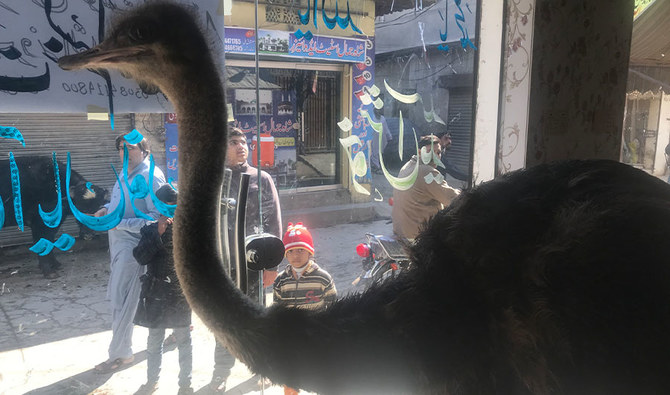LAHORE: It can outrun a horse and kick like a piston rod but at Mashooq Ali’s shop on Lahore’s sprawling Ferozpur Road, the lone ostrich can barely move or even spread its wings.
Ali bought the bird for Rs52,000 ($370) from a farm in Okara ten days ago . Since then, though patrons have thronged to his store for a glimpse of the African giant -- many marvelling at his magnificent size or tossing him things to eat -- there are few buyers.
Ostriches, the largest species of bird, were hunted for their meat, feathers and tough skin in the wild and now survive around the world mostly on special farms.
On average, a single ostrich can provide up to 33 kilograms of meat. The Punjab government’s fixed price per kilogramme is Rs1,300 ($9.5). A placard outside Ali’s shop announces that only large orders will be entertained.
“I cannot afford to make a loss by slaughtering it too early,” Ali told Arab News, pointing to the ostrich cowering in the corner of the shop and visible through a glass wall. “What if the rest [of the meat] doesn’t sell?”
Ali is one of hundreds of ostrich meat vendors in Pakistan’s richest and most populous province of Punjab, drawn to the business in 2017 when the provincial government granted a Rs14.5 million subsidy to farmers to breed and farm the birds. At the time, the government also promised to pay Rs10,000 per ostrich to those willing to rear between 25 to 100 chicks.
Initially, about a dozen farms cropped up in Punjab and ballooned to 275 in number. But two years later, despite government support and the best of intentions, the business has not taken off.
For many Pakistanis, ostrich meat is still as strange and exotic as it is expensive, so returns have been disappointingly low as supply has far outstripped demand. Also, hoping for high profit margins, farmers quickly jumped into the business without much knowledge of breeding practices., causing over-saturation of the market. This combined with the government’s unwillingness to renew subsides grounded the industry even before it could take off.
This is bad news for a government that had envisioned replacing beef with ostrich meat, which many say tastes like beef but is low in fat and cholesterol, and planned to rear enough birds to export eggs, skin and feathers.
“Pakistan has been trying to establish this business for the last 20 years,” Dr. Nasir Mukhtar, assistant professor at the Ostrich Research and Development Centre in Rawalpindi, said. “But unfortunately each attempt has failed.”
The Centre was set up to facilitate farming and train farmers in rearing and breeding the birds.
According to the Centre, Pakistan first imported 53 ostriches in 2013. The number shot up to 3,000 last year. But a lack of funds has meant the Centre has had to freeze many of its research initiatives.
“We were moving to our second phase of development, which included seeing what different products can be made from ostrich skin,” Dr. Muhammad Talha Sajjad, a project director at the Centre, said. “But the new government has not authorised new subsidies or grants for the industry. This has put farmers under a lot of stress.”
Dr Asif Rafiq, communications director at the Punjab ministry of livestock, confirmed the government had withdrawn the subsidy but that the ministry was in talks with the farmers’ association about a new grant. Before the funds could be released, he said, the gap between demand and supply needed to be closed.
Colonel (r) Maqsood Qureshi, who invested Rs1.8 million to start an ostrich farm but failed to make a profit, said the large number of farmers who initially flocked to the business had over-saturated the market.
“Many of these farmers had no know-how on how to rear the birds,” Qureshi said.
Rafiq at the ministry of livestock agreed that a majority of the farmers had not bothered to study the birds, breeding practices or the market before investing. But the industry could still, perhaps, take off, he said.
One measure to bolster the industry was setting up an ostrich farm on the periphery of Lahore’s old city where meat would be sold even on the meatless days of Tuesdays and Wednesdays.
“We are working on launching a marketing campaign to promote the bird,” Rafiq said. “This time we need maximum results.”
In Pakistan’s Punjab, big bird farms yield small dividends
In Pakistan’s Punjab, big bird farms yield small dividends

- Two years after the government announced a Rs14.5 subsidy for ostrich farmers, the business has failed to take off
- Over-saturation of the market and government unwillingness to renew subsides has grounded the ostrich industry
Tens of thousands flee northwest Pakistan over fears of military operation

- More than 70,000 people, mostly women and children, have fled remote Tirah region bordering Afghanistan
- Government says no military operation underway or planned in Tirah, a town in Khyber Pakhtunkhwa province
BARA, Pakistan: More than 70,000 people, mostly women and children, have fled a remote region in northwestern Pakistan bordering Afghanistan over uncertainty of a military operation against the Pakistani Taliban, residents and officials said Tuesday.
Pakistan’s Defense Minister Khawaja Mohammad Asif has denied the claim by residents and provincial authorities. He said no military operation was underway or planned in Tirah, a town in Khyber Pakhtunkhwa province.
Speaking at a news conference in Islamabad, he said harsh weather, rather than military action, was driving the migration. His comments came weeks after residents started fleeing Tirah over fears of a possible army operation.
The exodus began a month after mosque loudspeakers urged residents to leave Tirah by Jan. 23 to avoid potential fighting. Last August, Pakistan launched a military operation against Pakistani Taliban in the Bajau r district in the northwest, displacing hundreds of thousands of people.
Shafi Jan, a spokesman for the provincial government in Khyber Pakhtunkhwa, posted on X that he held the federal government responsible for the ordeal of the displaced people, saying authorities in Islamabad were retracting their earlier position about the military operation.
Khyber Pakhtunkhwa Chief Minister Suhail Afridi, whose party is led by imprisoned former Prime Minister Imran Khan, has criticized the military and said his government will not allow troops to launch a full-scale operation in Tirah.
The military says it will continue intelligence-based operations against Pakistani Taliban, who are known as Tehrik-e-Taliban Pakistan, or TTP. Though a separate group, it has been emboldened since the Afghan
Taliban returned to power in 2021. Authorities say many TTP leaders and fighters have found sanctuary in Afghanistan and that hundreds of them have crossed into Tirah, often using residents as human shields when militant hideouts are raided.
Caught in the middle are the residents of Tirah, who continued arriving in Bara.
So far, local authorities have registered roughly 10,000 families — about 70,000 people — from Tirah, which has a population of around 150,000, said Talha Rafiq Alam, a local government administrator overseeing the relief effort. He said the registration deadline, originally set for Jan. 23, has been extended to Feb. 5.
He said the displaced would be able to return once the law-and-order situation improves.
Among those arriving in Bara and nearby towns was 35-year-old Zar Badshah, who said he left with his wife and four children after the authorities ordered an evacuation. He said mortar shells had exploded in villages in recent weeks, killing a woman and wounding four children in his village. “Community elders told us to leave. They instructed us to evacuate to safer places,” he said.
At a government school in Bara, hundreds of displaced lined up outside registration centers, waiting to be enrolled to receive government assistance. Many complained the process was slow.
Narendra Singh, 27, said members of the minority Sikh community also fled Tirah after food shortages worsened, exacerbated by heavy snowfall and uncertain security.
“There was a severe shortage of food items in Tirah, and that forced us to leave,” he said.
Tirah gained national attention in September, after an explosion at a compound allegedly used to store bomb-making materials killed at least 24 people. Authorities said most of the dead were militants linked to the TTP, though local leaders disputed that account, saying civilians, including women and children, were among the dead.















